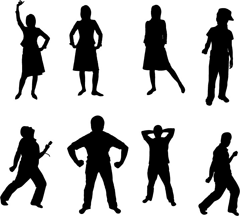
There's a war against women in our cities and on our lonely highways. And while the media focus on terrorists and saving Afghan women "over there," the women "over here" are missing and in many cases, murdered. The "missing women's" case refers to women missing from the Downtown Eastside of Vancouver and from numerous parts of British Columbia. A parallel case is occurring in Alberta where again, women have left behind concerned families and friends. The Native Women's Association of Canada (NWAC) estimates that more than 500 women have gone missing in the last 20 years.
What marks these women, aside from being women, is that many of them are aboriginal, many of them are searching or were searching for a sense of self and a sense of belonging. What also marks these women is that many of them left their homes and their families to work in the Downtown Eastside, or in the case of the Smithers-Houston-Burns Lake corridor, simply hitched a ride on a highway that offers virtually no other form of safe and periodic transportation.
Maggie de Vries, in her compelling book Missing Sarah concerning the disappearance of her sister, Sarah de Vries, from the downtown eastside, recounts the emotional turmoil and troubles Sarah encountered. Brought up a black child in a white family in Vancouver, Sarah was the brunt of considerable racist taunting while in school. Always searching for a sense of self and belonging, she sought and found momentary solace among others like herself who had experienced pain and sorrow as well as fleeting moments of joy and comfort.
Honest look at sex trade
But what about the other women who are also missing? Media depictions consistently strive to portray them as sisters, mothers, daughters all the while underlining their status as sex trade workers, or prostitutes in common parlance; prostitutes who were addicted to drugs and who in attempting to engage in survival sex for food, shelter and drugs, found themselves in an ultra-vulnerable position at the mercy of men who saw them as society's dispossessed and disposable ones.
What's missing in this coverage, and what's missing in a lot of other accounts of these women, is that they are and were human beings. Not just sisters, mothers and daughters. Those are the roles that society venerates and recognizes as being credible, roles that women are most often understood as playing. But these women were primarily human beings and whether they were sisters, daughters or mothers doesn't matter in the long run. They were human. This is a fundamental issue.
Without being recognized first as human beings and then as women and mothers, daughters, wives or sisters, their humanity becomes secondary, and instead roles which are both legitimized and illegitimized as in prostitution and drug-addiction become distinguishing features of their identities. Women's rights are human rights. That's the demand that was voiced so long ago and that gained prominence at the 1993 World Conference on Human Rights in Vienna.
Sex trade work seems to be the second issue highlighted in much of the discussion about missing women. Here again, the displacement of women's humanity is made possible by their designation as inhabitants of a degenerate zone and as engaging in work that is considered beyond the realms of social acceptability. Yet, there has been little analysis, aside from those who study this issue and those who live in such areas as to how and why such zones exist or why those who are desperate are pushed into inhabiting such sites.
What is 'normal'?
End Legislated Poverty offers a sophisticated argument of how poverty is made to exist -- how it must exist -- in order for the rest of society to continue as it is -- as classed and hierarchical, where few make the most money and the rest make varyingly lesser amounts. Particular groups of people are made more vulnerable to poverty based on their race, class and (dis)ability. How people are defined influences their life-chances, their survival and success in the world. But these definitions or the categories in which people are put into are not always of their own making. More often than not, these categorizations work in the interest of those who make them: those who stand to benefit from them. If we had no poor, we would have no rich -- the distinctions would be useless. Wealth and poverty stand side by side with few bridges linking the two worlds. One makes the other possible.
If we are to apply the same analysis to the sex trade, then it would seem that legitimized sex -- that which occurs in heterosexual relationships, sanctioned by church and state, and supported by middle class values of what constitutes the 'normal' state of affairs within marriage –- remains the hallmark of respectability and acceptability. However, sex that is bought and sold -- outside the bedroom, uncontrolled by the state and unsanctioned by the church -- becomes dangerous. It is stigmatized.
The more visible it is, the more stigmatized it is. The hierarchy within the sex trade reflects this play of visibility and value. The more privatized the sale of sex, the more couched it is by the signifiers of middle classness, as in a private apartment, a telephone number, a permanent location. The more visible the trade is, the more likely that it will be openly denigrated, patrolled, policed and subjected to institutional violence. We all know it exists, but we don't want to be confronted by it. Privatized, the sex trade is out of the public gaze, but in our neighborhoods, we deem it to be intolerable.
Dispossessed and disposable
Yet, violence against women transcends any hierarchy. Whether it is in the massage houses, the escort services or the streets, the violence is there. Just as violence is a reality for women inside and outside heterosexual unions sanctioned by church and state, it is ever-present in lives of girls and young women who fail to show signs of adhering to heterosexual norms or who are somehow categorized as "different." Violence against women is rampant. All the statistics bear this out -- and even if the rates of female homicides are down, the rates of sexual harassment are up. The continuum of violence persists though its manifestations adjust themselves according to what is rendered acceptable and passable.
In thinking through the case of the missing women, what is so striking is how many of these women were themselves fleeing other forms of violence, but that in fleeing, they ended up bearing the brunt of more explicit forms of violence.
Their positions as society's dispossessed and disposable made them vulnerable to other forms of violence. Had it not been for the persistence of their families and friends, would we as members of this society miss them? If a hundred soldiers were to go missing in Afghanistan, would there not be a national outcry? But then again, it's a lot easier to deal with a war 'out there' then it is to deal with the war at home.
The Highway of Tears Symposium Recommendations Report will be released at a press conference in Prince George this afternoon (June 21). To read the report when it is posted, go here.
Yasmin Jiwani is an associate professor at Concordia University. ![]()















Tyee Commenting Guidelines
Comments that violate guidelines risk being deleted, and violations may result in a temporary or permanent user ban. Maintain the spirit of good conversation to stay in the discussion.
*Please note The Tyee is not a forum for spreading misinformation about COVID-19, denying its existence or minimizing its risk to public health.
Do:
Do not: